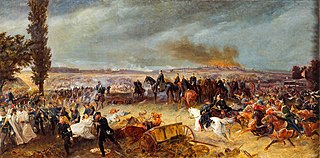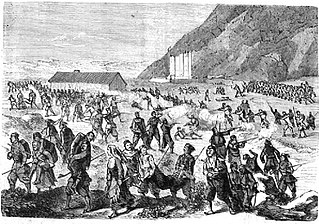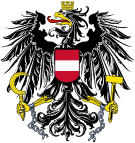
The Austro-Prussian War or Seven Weeks' War was a war fought in 1866 between the Austrian Empire and the Kingdom of Prussia, with each also being aided by various allies within the German Confederation. Prussia had also allied with the Kingdom of Italy, linking this conflict to the Third Independence War of Italian unification. The Austro-Prussian War was part of the wider rivalry between Austria and Prussia, and resulted in Prussian dominance over the German states.

Mobilization, in military terminology, is the act of assembling and readying troops and supplies for war. The word mobilization was first used, in a military context, to describe the preparation of the Imperial Russian Army during the 1850s and 1860s. Mobilization theories and techniques have continuously changed since then. The opposite of mobilization is demobilization.
The Unionist Party was a centre-right historical political party in Canada, composed primarily of former members of the Conservative party with some individual Liberal Members of Parliament. It was formed in 1917 by MPs who supported the "Union government" formed by Sir Robert Borden during the First World War, formed the government through the final years of the war, and was a proponent of conscription. It was opposed by the remaining Liberal MPs, who sat as the official opposition.
Conscription in Australia, or mandatory military service also known as national service, has a controversial history dating back to the first years of nationhood. Australia currently only has provision for conscription during times of war.

Military service is service by an individual or group in an army or other militia, whether as a chosen job or as a result of an involuntary draft (conscription).

Conscription in the United States, commonly known as the draft, has been employed by the federal government of the United States in five conflicts: the American Revolution, the American Civil War, World War I, World War II, and the Cold War. The third incarnation of the draft came into being in 1940 through the Selective Training and Service Act. It was the country's first peacetime draft. From 1940 until 1973, during both peacetime and periods of conflict, men were drafted to fill vacancies in the United States Armed Forces that could not be filled through voluntary means. The draft came to an end when the United States Armed Forces moved to an all-volunteer military force. However, the Selective Service System remains in place as a contingency plan; all male citizens between the ages of 18 and 25 are required to register so that a draft can be readily resumed if needed. United States Federal Law also provides for the compulsory conscription of men between the ages of 17 and 45 and certain women for militia service pursuant to Article I, Section 8 of the United States Constitution and 10 U.S. Code § 246.
Events from the year 1918 in Ireland.

The 1917 Australian plebiscite was held on 20 December 1917. It contained just the one question.

The Conscription Crisis of 1918 stemmed from a move by the British government to impose conscription in Ireland in April 1918 during the First World War. Vigorous opposition was led by trade unions, Irish nationalist parties and Roman Catholic bishops and priests. A conscription law was passed but was never put in effect; no one in Ireland was drafted into the British Army. The proposal and backlash galvanised support for political parties which advocated Irish separatism and influenced events in the lead-up to the Irish War of Independence.
The Republic of China (Taiwan) has maintained a policy of conscription for all qualified males of military age since 1951. The Taiwanese government planned originally to end this policy in 2014, but abolishing conscription is quite controversial among Taiwanese society, and hence the government has not yet created a firm schedule for its abolition. Females from the outlying islands within the province of Fuchien, which are geographically closest to mainland China, were also required to serve in a civil defense role, although this requirement has been dropped since the lifting of martial law. Although the majority of all enlisted positions in the ROC Armed Forces have been and are currently filled by draftees, the government intends to gradually expand the number of volunteer soldiers with the eventual goal of forming an all volunteer military. However, even then there will be compulsory basic training for all males reaching 18. Recent years have also seen an increase in the service options open to draftees, including alternative service with the Ministry of the Interior (MOI), as well as specialized service options for draftees in specific professions. The draft process is set forth under the ROC Military Service Act under the auspices of the MOI's National Conscription Agency as well as by Article 20 of the ROC Constitution.

World War I, also known as the First World War or the Great War, was a global war originating in Europe that lasted from 28 July 1914 to 11 November 1918. Contemporaneously described as "the war to end all wars", it led to the mobilisation of more than 70 million military personnel, including 60 million Europeans, making it one of the largest wars in history. It is also one of the deadliest conflicts in history, with an estimated nine million combatants and seven million civilian deaths as a direct result of the war, while resulting genocides and the 1918 influenza pandemic caused another 50 to 100 million deaths worldwide.

Nicos Anastasiades is a Cypriot politician who has been President of Cyprus since 2013. On 4 February 2018, he was re-elected for a second five-year term. Previously, he was the leader of Democratic Rally and a Member of Parliament for Limassol.

Austro-Turkish War, was fought in 1788–91 between the Habsburg Monarchy and the Ottoman Empire, concurrently with the Russo-Turkish War (1787–1792). It is sometimes referred to as the Habsburg–Ottoman War or the Austro-Ottoman War.
Conscription in the United Kingdom has existed for two periods in modern times. The first was from 1916 to 1920, the second from 1939 to 1960, with the last conscripted soldiers leaving the service in 1963. Known as Military Service from 1916 to 1920, the system of conscription from 1939 to 1960 was called National Service, but between 1939 and 1948, it was often referred to as "war service" in documents relating to National Insurance and pension provision.

The Imperial Russian Army was the land armed force of the Russian Empire, active from around 1721 to the Russian Revolution of 1917. In the early 1850s, the Russian army consisted of more than 900,000 regular soldiers and nearly 250,000 irregulars.
During the second half of World War One, the First Australian Imperial Force experienced a shortage of men as the number of men volunteering to fight overseas declined and the casualty rate increased. At the time, military service within the Commonwealth of Australia and its territories was compulsory for Australian men, but that requirement did not extend to conflict outside of Australia. In 1916, Prime Minister Billy Hughes called a plebiscite to determine public support for extending conscription to include military service outside the Commonwealth for the duration of the war. The referendum, held on 28 October 1916, narrowly rejected the proposal. A second plebiscite, held a year later on 20 December 1917, also failed to gain a majority.

Norbert Darabos is an Austrian politician and currently secretary general of the Social Democratic Party of Austria (SPÖ). From 2007 to 2013, he served as Minister of National Defence under the chancellors Gusenbauer and Faymann. He is married and has two children.
NEOS – The New Austria and Liberal Forum is a liberal political party in Austria.

The Krivošije uprising of 1869 was an internal conflict in the far south of the Austro-Hungarian Empire that broke out following the Austro-Hungarian government's decision to extend military conscription to the tribe and region of Krivošije. It lasted from October 1869 until a formal peace accord was signed on 11 January 1870. The rebels managed to defeat the Austro-Hungarian army detachments sent against them and in the end the government conceded on all points of dispute.


















